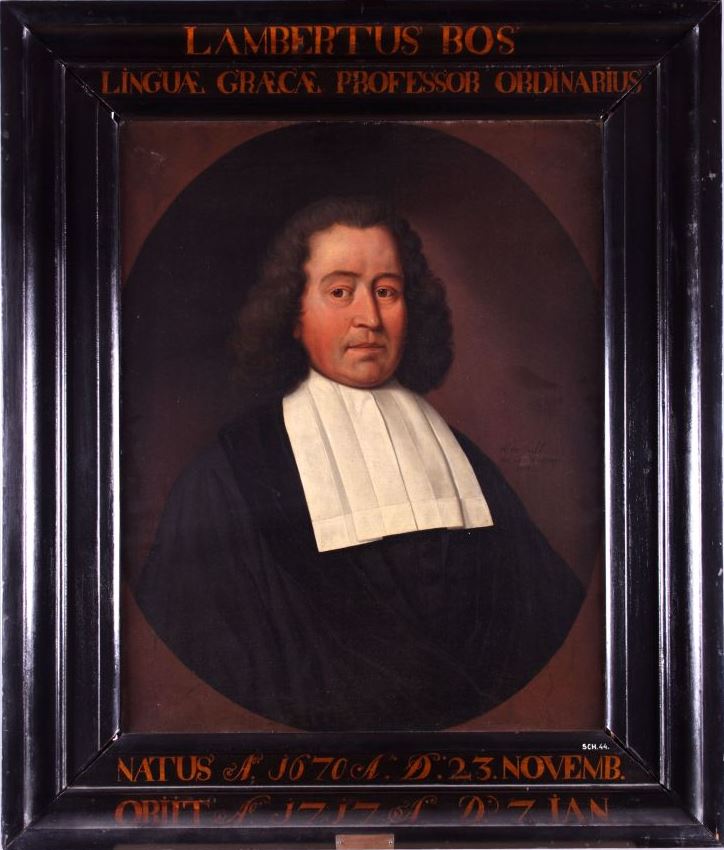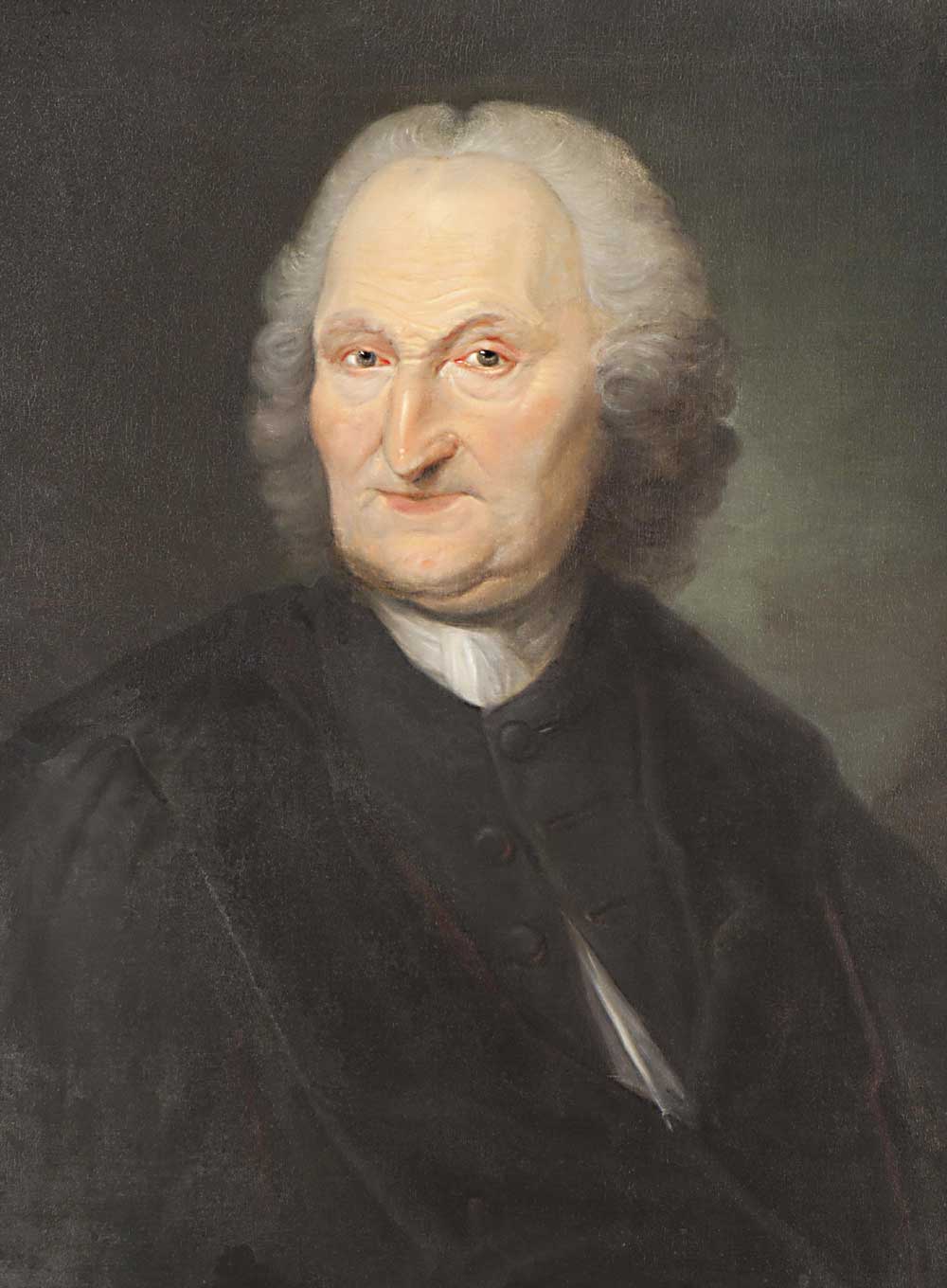|
Lambert Bos
Lambert Bos (23 October 1670 – 6 January 1717) (or Lambertus Bos or Lammert Bos) was a Dutch scholar, critic and forerunner of Tiberius Hemsterhuis. Lambert Bos was born at Workum in Friesland, where his father, Jakob Bos, was headmaster of the school. His mother was Gerarda de Haan. He was baptised in the reformed church in Workum on 25 November 1670. He went to the University of Franeker (suppressed by Napoleon in 1811), and was appointed lector in 1697 and professor of Greek in 1704. On 28 February 1712 he married Feiktje Doeckes Sineda, the widow of the priest Gerradus Horreus, and earlier the widow of Dominic Camper. after an uneventful life he died at Franeker in 1717. His most famous work, ''Ellipses Graecae'' (1702), was translated into English by John Seager (1830); and his ''Antiquitates Graecae'' (1714) passed through several editions. He also published ''Vetus Testamentum, Ex Versione lxx. Interpretum'' [...More Info...] [...Related Items...] OR: [Wikipedia] [Google] [Baidu] |
Scholar
A scholar is a person who pursues academic and intellectual activities, particularly academics who apply their intellectualism into expertise in an area of study. A scholar can also be an academic, who works as a professor, teacher, or researcher at a university. An academic usually holds an advanced degree or a terminal degree, such as a master's degree or a doctorate ( PhD). Independent scholars, such as philosophers and public intellectuals, work outside of the academy, yet publish in academic journals and participate in scholarly public discussion. Definitions In contemporary English usage, the term ''scholar'' sometimes is equivalent to the term ''academic'', and describes a university-educated individual who has achieved intellectual mastery of an academic discipline, as instructor and as researcher. Moreover, before the establishment of universities, the term ''scholar'' identified and described an intellectual person whose primary occupation was professional research. In ... [...More Info...] [...Related Items...] OR: [Wikipedia] [Google] [Baidu] |
Critic
A critic is a person who communicates an assessment and an opinion of various forms of creative works such as art, literature, music, cinema, theater, fashion, architecture, and food. Critics may also take as their subject social or government policy. Critical judgments, whether derived from critical thinking or not, weigh up a range of factors, including an assessment of the extent to which the item under review achieves its purpose and its creator's intention and a knowledge of its context. They may also include a positive or negative personal response. Characteristics of a good critic are articulateness, preferably having the ability to use language with a high level of appeal and skill. Sympathy, sensitivity and insight are important too. Form, style and medium are all considered by the critic. In architecture and food criticism, the item's function, value and cost may be added components. Critics are publicly accepted and, to a significant degree, followed because of t ... [...More Info...] [...Related Items...] OR: [Wikipedia] [Google] [Baidu] |
Tiberius Hemsterhuis
Tiberius Hemsterhuis (9 January 16857 April 1766) was a Dutch philologist and critic. Life He was born in Groningen. His father, a learned physician, gave him a good early education and he entered the university of his native city in his fifteenth year, where he proved himself the best student of mathematics. After a year or two at Groningen, he was attracted to the University of Leiden by the fame of Perizonius. While there, he was entrusted with the duty of arranging the manuscripts in the library. Though he accepted an appointment as professor of mathematics and philosophy at Amsterdam in his twentieth year, he had already directed his attention to the study of the ancient languages. In 1717 Hemsterhuis was appointed a professor of Greek at the University of Franeker to replace Lambert Bos, but he did not enter on his duties there till 1720. In 1738 he became a professor of national history as well. Two years afterward, he was called to teach the same subjects at Leiden, whe ... [...More Info...] [...Related Items...] OR: [Wikipedia] [Google] [Baidu] |
Workum
Workum () is a city located in the municipality of Súdwest-Fryslân in Friesland, Netherlands. It received city rights in 1399 and is one of the eleven cities of Friesland. It had a population of 4,435 in January 2017. - CBS Statline. Overview Nowadays, Workum is probably best known for having a museum dedicated to the very popular artist . There are four s in Workum;[...More Info...] [...Related Items...] OR: [Wikipedia] [Google] [Baidu] |
Friesland
Friesland (, ; official fry, Fryslân ), historically and traditionally known as Frisia, is a province of the Netherlands located in the country's northern part. It is situated west of Groningen, northwest of Drenthe and Overijssel, north of Flevoland, northeast of North Holland, and south of the Wadden Sea. As of January 2020, the province had a population of 649,944 and a total area of . The province is divided into 18 municipalities. The capital and seat of the provincial government is the city of Leeuwarden (West Frisian: ''Ljouwert'', Liwwaddes: ''Liwwadde''), a city with 123,107 inhabitants. Other large municipalities in Friesland are Sneek (pop. 33,512), Heerenveen (pop. 50,257), and Smallingerland (includes city of Drachten, pop. 55,938). Since 2017, Arno Brok is the King's Commissioner in the province. A coalition of the Christian Democratic Appeal, the People's Party for Freedom and Democracy, the Labour Party, and the Frisian National Party forms the executive ... [...More Info...] [...Related Items...] OR: [Wikipedia] [Google] [Baidu] |
University Of Franeker
The University of Franeker (1585–1811) was a university in Franeker, Friesland, the Netherlands. It was the second oldest university of the Netherlands, founded shortly after Leiden University. History Also known as ''Academia Franekerensis'' or the University of Friesland, it consisted of departments of Theology, Law, Medicine, Philosophy, Mathematics and Physics. Among its well-known students was Peter Stuyvesant, last director-general of the Dutch colony of New Netherland. Initially the university had an excellent reputation, attracting students from far and wide, but from 1700 its fortune changed. The university was disbanded by Napoleon in 1811, along with the Universities of Harderwijk and Utrecht. After the end of the French régime, the university was not restored. Instead, an ''Athenaeum illustre'' was founded, which did not have the right to issue doctoral degrees. In 1843, the ''Athenaeum'' itself was disbanded because of a lack of students. Today, Franeker has no in ... [...More Info...] [...Related Items...] OR: [Wikipedia] [Google] [Baidu] |
Napoleon
Napoleon Bonaparte ; it, Napoleone Bonaparte, ; co, Napulione Buonaparte. (born Napoleone Buonaparte; 15 August 1769 – 5 May 1821), later known by his regnal name Napoleon I, was a French military commander and political leader who rose to prominence during the French Revolution and led successful campaigns during the Revolutionary Wars. He was the ''de facto'' leader of the French Republic as First Consul from 1799 to 1804, then Emperor of the French from 1804 until 1814 and again in 1815. Napoleon's political and cultural legacy endures to this day, as a highly celebrated and controversial leader. He initiated many liberal reforms that have persisted in society, and is considered one of the greatest military commanders in history. His wars and campaigns are studied by militaries all over the world. Between three and six million civilians and soldiers perished in what became known as the Napoleonic Wars. Napoleon was born on the island of Corsica, not long af ... [...More Info...] [...Related Items...] OR: [Wikipedia] [Google] [Baidu] |
Franeker
Franeker (; fry, Frjentsjer) is one of the eleven historical cities of Friesland and capital of the municipality of Waadhoeke. It is located north of the Van Harinxmakanaal and about 20 km west of Leeuwarden. As of 1 January 2014, it had 12,781 inhabitants. The Eise Eisinga Planetarium, established in 1781, is located in the city. History Franeker was founded around 800 as a Carolingian stronghold. The name probably derives from ''Froon-acker'', meaning "land of the lord/king"; the oldest street in the city is still called Froonacker. Beginning around the 11th century, Franeker developed into the administrative center Westergoa. Franeker received city rights in 1374. In the 15th century, Albert, Duke of Saxony established himself in Franeker. The city appeared for a time to be growing into the primary city of Friesland, but was eventually overshadowed in this role by Leeuwarden. During the period of the Dutch Revolt, the town sided early on with William I. From 1585 to ... [...More Info...] [...Related Items...] OR: [Wikipedia] [Google] [Baidu] |
John Seager
John is a common English name and surname: * John (given name) * John (surname) John may also refer to: New Testament Works * Gospel of John, a title often shortened to John * First Epistle of John, often shortened to 1 John * Second Epistle of John, often shortened to 2 John * Third Epistle of John, often shortened to 3 John People * John the Baptist (died c. AD 30), regarded as a prophet and the forerunner of Jesus Christ * John the Apostle (lived c. AD 30), one of the twelve apostles of Jesus * John the Evangelist, assigned author of the Fourth Gospel, once identified with the Apostle * John of Patmos, also known as John the Divine or John the Revelator, the author of the Book of Revelation, once identified with the Apostle * John the Presbyter, a figure either identified with or distinguished from the Apostle, the Evangelist and John of Patmos Other people with the given name Religious figures * John, father of Andrew the Apostle and Saint Peter * Pope John ... [...More Info...] [...Related Items...] OR: [Wikipedia] [Google] [Baidu] |
Thomas Magister
Thomas, surnamed Magister or Magistros ( el, Θωμάς Μάγιστρος), also known by the monastic name Theodoulos Monachos, was a native of Thessalonica, a Byzantine scholar and grammarian and confidential adviser of Andronikos II Palaiologos (ruled 1282–1328). His chief work, , is a collection of selected Attic words and phrases, partly arranged in alphabetical order, compiled as a help to Greek composition from the works of Phrynichus, Ammonius, Herodian, and Moeris. He also wrote ''scholia'' on Aeschylus, Sophocles, Euripides (with a life), and three of the comedies of Aristophanes; the ''scholia'' on Pindar, attributed to him in two manuscripts, are now assigned to Demetrius Triclinius. His speeches and letters consist partly of declamations on the usual sophistical themes, partly dealing with contemporary historical events: an argument between the fathers of Cynaegirus and Callimachus (two Athenians who fell at the Battle of Marathon) as to which had the better ... [...More Info...] [...Related Items...] OR: [Wikipedia] [Google] [Baidu] |
1670 Births
Year 167 ( CLXVII) was a common year starting on Wednesday (link will display the full calendar) of the Julian calendar. At the time, it was known as the Year of the Consulship of Aurelius and Quadratus (or, less frequently, year 920 ''Ab urbe condita''). The denomination 167 for this year has been used since the early medieval period, when the Anno Domini calendar era became the prevalent method in Europe for naming years. Events By place Roman Empire * Lucius Aurelius Verus Augustus and Marcus Ummidius Quadratus Annianus become Roman Consuls. * The Marcomanni tribe wages war against the Romans at Aquileia. They destroy aqueducts and irrigation conduits. Marcus Aurelius repels the invaders, ending the Pax Romana (Roman Peace) that has kept the Roman Empire free of conflict since the days of Emperor Augustus. * The Vandals (Astingi and Lacringi) and the Sarmatian Iazyges invade Dacia. To counter them, Legio V ''Macedonica'', returning from the Parthian War, moves its ... [...More Info...] [...Related Items...] OR: [Wikipedia] [Google] [Baidu] |






